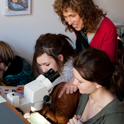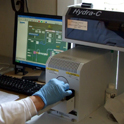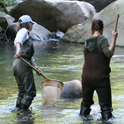Programs
Our work is divided into six program areas
To learn more about a program,
move your cursor over the appropriate image above.
For a more complete description of a program and its related projects,
click the coressponding image.
 Q
Q: Why are insects crawling over this page?
A: These benthic macroinvertebrates
(bottom-dwelling stream bugs big enough to see without a microscope) tell us a great deal about water quality.
Training
Sierra Streams Institute has developed considerable expertise in all aspects
of running a rigorous citizen monitoring program, and we have exercised regional leadership
in using science and data to guide watershed restoration and policy making.
Dedicated to sharing this expertise, we offer less-experienced groups training in
watershed research, water-quality monitoring, benthic macroinvertebrate sampling
and identification, bioassessment, data analysis, habitat restoration,
applying for grants and securing funding, volunteer training and recruitment,
working with local and regional governments and agencies, compliance with regulations,
organization development, and capacity-building.
Watershed Restoration
Gold mining, residential development, road building, agriculture, and other activities have left
Sierran watersheds with a variety of lasting impacts that compromise water quality and the ability
of streams and landscapes to provide all-important ecological services. Active restoration is necessary
for correcting these problems. Our restoration efforts include the following: abandoned mine remediation,
salmon habitat restoration, invasive non-native species removal, restoration of native vegetation,
geomorphological restoration, and integration of traditional native practices.
Science Education
Sierra Streams Institute created its science education program to meet the critical need for citizens well-versed
in the concepts and methods of science. Recognizing that our watershed offers the perfect
setting for making science relevant and exciting, SSI partners with local schools to offer
field-based science education and classroom
instruction in watershed-related science topics. SSI also writes watershed-based science curriculum materials,
offers classes for home-school students, and conducts several types of science enrichment activities.
Research
Watershed science is at the confluence of biology, geology, hydrology, chemistry, and physics.
It also involves more specialized subfields such as restoration ecology, limnology, soil science,
environmental remediation, and fluvial geomorphology. Watersheds therefore offer rich opportunities
for expanding our knowledge of basic natural processes and interactions; even more importantly, watersheds
and streams are increasingly being recognized as ground-zero in our efforts to adapt to the ongoing
effects of global climate change. Working from our foundation of scientific expertise, we seek to become
one of the regional leaders in watershed research by undertaking studies, publishing papers, presenting
at conferences, and sharing data with universities and government agencies.
Lab and Testing Services
Because most regional groups have the capacity to perform
only the most rudimentary lab services in-house, our ability to do mercury
analysis and benthic macroinvertebrate identification work is unusual—if not unique—among
watershed groups in the Sierra Nevada region. Our services include water quality monitoring, chemical assays,
benthic macroinvertebrate sampling and identification, and
analysis of mercury and other heavy metals.
Friends of Deer Creek
Activities specific to our home watershed of Deer Creek—monitoring, restoration,
watershed protection, mine remediation, and the like—are considered part of this
program. Formerly framing our identity as Friends of Deer Creek, these activities still constitute
a core part of our mission; they simply take place now within a larger geographic context.















